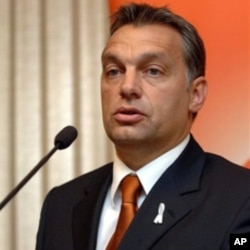Hungarian Prime Minister Viktor Orban has warned Hungary will fight back if the 27-nation European Union interferes in what he calls internal politics while his country holds the EU's presidency. Mr. Orban spoke Wednesday while facing a largely hostile European Parliament where he was challenged about a law that critics claim endangers media freedom.
Prime Minister Orban was interrupted by European parliamentarians who condemned what they view as Europe's most restrictive media law.
The legislation, which came into force on New Year's Day, expands the state's power to monitor and penalize news media.
A Media Council, appointed by Mr. Orban's center-right government, can fine broadcasters up to nearly $1 million and websites or newspapers over $100,000 if their news coverage is considered unbalanced or immoral.
At the start of the prime minister's speech at the European Parliament session in Strasbourg, some EU legislators covered their mouth with duct tape and held banners protesting Mr. Orban's controversial media law.
A visibly angry Mr. Orban told the legislators not to mix up criticism of Hungarian domestic politics with its tenure as president of the European Union.
He said he was ready to fight if those issues are threatening to overshadow Hungary's six-month EU presidency.
Orban said he heard with his own ears that Hungary was accused of moving towards dictatorship. He said that he viewed the accusation as an offense towards the Hungarian nation and that he would defend his home, his Hungary. He strongly denied that the Hungarian law has anything to do with dictatorship.
Mr. Orban's views were shared by the leader of the conservative European People's Party, which includes the prime minister's Fidesz party.
He also received support from British skeptics, a representative of Italian premier Silvio Berlusconi's party and members of the Hungarian far-right party Jobbik.
But several others disagreed.
The leader of the Social Democratic faction in parliament, Martin Schulz, urged Mr. Orban to withdraw the legislation.
The German politician said, "values such as freedom, democracy and justice are common goals." Schulz said condemning legislation that does not seem to represent these values, does not mean that parliamentarians are criticizing the Hungarian people. He urged Mr. Orban not to divide Europe and added "only when all EU member states cooperate...can Europe succeed."
The European Commission already said that Hungary's media law might not meet all of its standards for a free and fair press. The Organization for Security and Cooperation in Europe has said in Budapest that the law could undermine pluralism.
European Commission President Jose Manuel Barroso revealed Wednesday that the EU executive would send a letter this week to Hungarian authorities asking for 'clarifications.'













